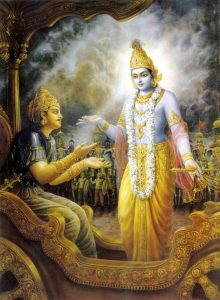Reading Time: 5 minutes
Lord Krishna, Hamunam, Angad, Arjun, Duryodhana, Yaksha and Yudhistra had negotiated through tricky situations, reasons Soumya. Could they negotiate negotiations in our mythology? An exclusive for Different Truths.


The most famous negotiation story involves the master motivator, Lord Krishna himself, as the Pandava Dyutam (messenger).
Here his mission was to negotiate a truce with the Kauravas, and apparently, he bent over backwards to accommodate them, at a big cost to his friends the Pandavas, but still failed in his task. So was he a failure as a negotiator? Apparently yes.
Here his mission was to negotiate a truce with the Kauravas, and apparently, he bent over backwards to accommodate them, at a big cost to his friends the Pandavas, but still failed in his task. So was he a failure as a negotiator? Apparently yes.
But in any successful negotiation, there is a hidden agenda, and while making the opponent feel that he has won, actually the agenda was served.
The trick lies in knowing the opponent. Krishna knew well that Duryodhan would not agree, and he too wanted the war to bring back dharma, but it was important to show the world that despite all efforts war could not be averted and that the Pandavas were willing to compromise to any extent but the Kauravas left no option but war
The trick lies in knowing the opponent. Krishna knew well that Duryodhan would not agree, and he too wanted the war to bring back dharma, but it was important to show the world that despite all efforts war could not be averted and that the Pandavas were willing to compromise to any extent but the Kauravas left no option but war, which most reluctantly the Pandavas would participate in. Thus, for them, it would be dharma yudh.
Thus, Krishna, the master negotiator got what he wanted, while giving the impression that the other side won. This is the art of negotiation. Getting the opposite party to feel that they have won, while you get what you want.
If we compare this with Rama Dyutam, Lord Hanuman he isn’t a diplomat at all. He bluntly serves an ultimatum to a headstrong opposition Ravan and ends up burning the city down. Although here too the end result is as desired by Ram, though the process is far from diplomatic. However, sometimes this method may be the most effective.
If we compare this with Rama Dyutam, Lord Hanuman he isn’t a diplomat at all. He bluntly serves an ultimatum to a headstrong opposition Ravan and ends up burning the city down. Although here too the end result is as desired by Ram, though the process is far from diplomatic. However, sometimes this method may be the most effective. An interesting facet of negotiation is seen in Lord Rama’s official representative to negotiate with Ravan, Angad, the Prince of the Vanaras.
To put him at a disadvantage Ravan shows him the discourtesy of giving him a low seat. But he turns the tables by creating a higher seat with his tail thus getting the psychological upper hand. This is commonly used in today’s negotiations where one party is put in a psychologically disadvantageous position by keeping them waiting or seat placement or other methods. We have to negate this by repositioning ourselves psychologically.
The greatest negotiation of all was, of course, the one between Krishna and Arjuna, which was more in the form of motivational talk and it resulted not only in convincing Arjuna to take up battle with his relatives, teachers and revered mentors and at the same time creating a divine song that becomes a masterpiece of world literature as well as the centrepiece of the world’s oldest religion.
The greatest negotiation of all was, of course, the one between Krishna and Arjuna,

The more interesting negotiation was the one between Arjuna and Duryodhana trying to woo Krishna to join their side.
This is a classic example as both sides went back happy that they have got what they wanted but Arjuna got the winning deal.
The first was positioning. Arjuna took the apparently weaker position near the feet, while Duryodhana was on a throne near the head of the sleeping Krishna. But on waking Krishna sees Arjuna first and gives him first chance to speak. Thus, the carefully chosen position in a negotiation can be a winner while looking weaker.
The first was positioning. Arjuna took the apparently weaker position near the feet, while Duryodhana was on a throne near the head of the sleeping Krishna. But on waking Krishna sees Arjuna first and gives him first chance to speak. Thus, the carefully chosen position in a negotiation can be a winner while looking weaker.
Next, the options were the vast Yadav army or Krishna alone as a non-combatant. Duryodhana took the obvious choice of the army and went back thinking that he had won but Arjuna knew that having the master strategist Krishna on the side planning the campaign without actually fighting would be far more effective than the leaderless army.
It’s the backroom boys on the drawing board who win the war.
Thus, we should be clear as to our goals when negotiating and make the winners choice rather than the obvious ones.
Another form of negotiation requires detailed information preparation and judicious analysis of responses.
The one between the Yaksha and Yudhishthira to free his brothers by answering a series of questions whose answers had to satisfy the Yaksha is a case in point. Here, Yudhishthira’s replies to a set of ethical and philosophical questions pleased the Yaksha, who agreed to free the captive brothers. The brothers had underestimated the Yaksha and their arrogance led to their capture.
The one between the Yaksha and Yudhishthira to free his brothers by answering a series of questions whose answers had to satisfy the Yaksha is a case in point. Here, Yudhishthira’s replies to a set of ethical and philosophical questions pleased the Yaksha, who agreed to free the captive brothers. The brothers had underestimated the Yaksha and their arrogance led to their capture. Yudhistira’s knowledge of the Yakshas power and his weakness for philosophical debate won him the negotiations.
Thus, a careful swat analysis of the opposition and advance preparation can win a negotiation. It never pays to underestimate our opponents.
Photo from the Internet














